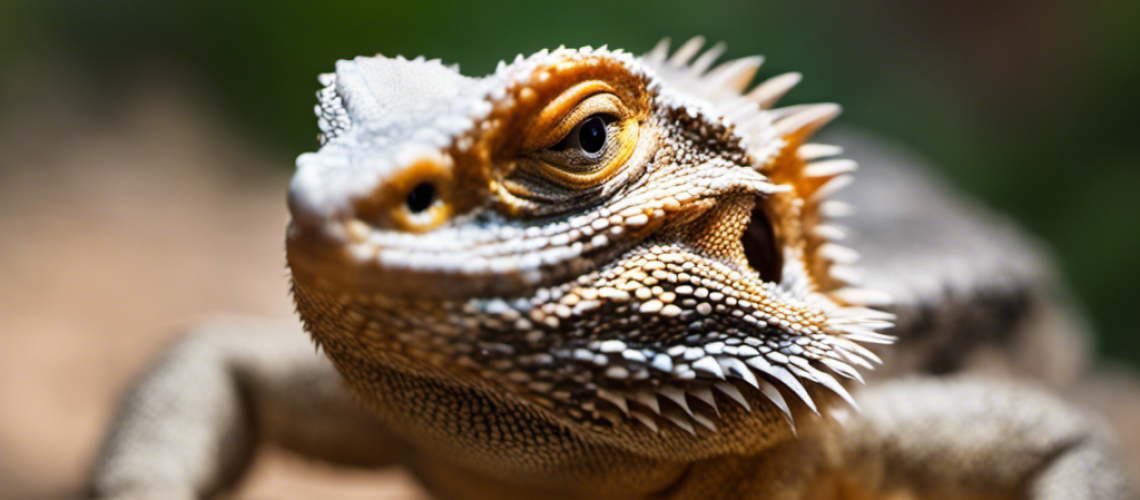Vomiting in bearded dragons is a common occurrence that may have many causes. It can be worrying for owners of these reptiles, but understanding the symptoms and possible causes of vomiting can help to diagnose and treat this condition.
This article will provide an overview of the causes, signs, diagnosis, treatment and prevention of vomiting in bearded dragons.
Key Takeaways
- Dehydration issues and insufficient water intake can cause vomiting in bearded dragons.
- Sudden or drastic changes in diet, as well as lack of gradual introduction of new food items, can lead to vomiting.
- Discolored feces, frequent regurgitation, refusal to eat, and gastrointestinal distress are common symptoms of vomiting in bearded dragons.
- To treat vomiting in bearded dragons, it is important to ensure a balanced diet with adequate vitamins and minerals, increase water intake, reduce environmental stress, and address the underlying cause of vomiting.
Common Causes of Vomiting in Bearded Dragons
Vomiting in Bearded Dragons can be caused by a variety of factors, including dehydration issues and dietary changes. It is important to monitor the lizard’s water intake to ensure it is getting enough fluids.
In addition, sudden or drastic changes to the diet may contribute to vomiting. It is best for owners to gradually introduce any new food items over time in order to help their pet adjust and avoid digestive distress.
If your dragon is displaying signs of vomiting, contact your veterinarian for advice on nutrition and hydration needs.
Symptoms of Vomiting in Bearded Dragons
Visible signs of gastrointestinal distress, such as vomiting, may be observed in Bearded Dragons. Symptoms to look out for include:
1) Discolored feces
2) Frequent regurgitation
3) Refusal to eat
Heat stress or dehydration can cause the dragon’s digestive system to malfunction resulting in vomiting. It is important to monitor and control the temperature and humidity of its habitat to prevent such occurrences.
Additionally, providing a balanced diet with appropriate supplementation will ensure its optimal health and wellbeing.
Diagnosing the Cause of Vomiting
In order to diagnose the cause of vomiting, it is important to analyze the environment and dietary habits of the reptile. Factors such as dietary changes, stress management, or environmental conditions can all contribute to a bearded dragon throwing up.
To best diagnose why a bearded dragon is vomiting, an owner should observe their reptile’s behavior closely and keep track of any changes in its diet or environment. It may also be necessary for an owner to consult with an experienced herpetologist or veterinarian who can provide additional tests, treatments, or advice that will help resolve the issue.
Treating Vomiting in Bearded Dragons
Treatment for vomiting in reptiles varies depending on the underlying cause. In the case of bearded dragons, dietary changes are key to treating vomiting. These can include:
- Ensuring a balanced diet with adequate vitamins and minerals
- Increasing water intake or offering hydration solutions
- Reducing environmental stress through proper humidity levels and temperature regulation.
The goal of treatment is to provide relief from symptoms while addressing the underlying cause of vomiting, which can be difficult but not impossible with persistence and patience.
Prevention of Vomiting in Bearded Dragons
Preventing vomiting in reptiles, such as bearded dragons, requires attention to diet and environmental factors. Providing a balanced nutrition with adequate amounts of vitamins and minerals is essential. Stress should be avoided through providing an environment that replicates the natural habitat of a bearded dragon. This includes an appropriate temperature range, humidity levels, lighting schedule, clean enclosure, and enrichment activities.
Additionally, access to fresh water must be available at all times for hydration purposes. By providing adequate nutrition and avoiding stressors, owners can help prevent vomiting in their beloved bearded dragons.
Frequently Asked Questions
What Are the Signs of a Healthy Bearded Dragon?
A healthy bearded dragon will exhibit regular exercise, have a diverse diet, and display an alert demeanor. All of these signs indicate a thriving reptile in its natural habitat. Such behavior should be encouraged to ensure the wellbeing of the animal.
What Should I Do if My Bearded Dragon Is Throwing Up?
If your bearded dragon is throwing up, it may be due to dietary changes or digestive problems. To help your pet, make sure it has access to clean water and a balanced diet of fruits and vegetables. If symptoms persist, consult a vet for further advice.
Should I Take My Bearded Dragon to the Vet if It Is Throwing Up?
It is best to take your bearded dragon to the vet if it is throwing up. Diet changes and stress levels may be contributing factors to the vomiting, and only a medical professional can determine what is causing it and how best to treat it. Early intervention is key for optimal health.
What Temperature Should I Keep My Bearded Dragon’s Habitat?
For optimal health, a bearded dragon’s habitat should be kept between 75-85°F with a basking area of 90-95°F. Proper heating setup and habitat design are essential for maintaining these temperatures. Using lamps, heaters, and rocks can create the ideal environment for your bearded dragon.
How Often Should I Feed My Bearded Dragon?
Bearded dragons should have a balanced diet that meets their dietary needs. Feeding them every other day is recommended, providing a variety of fresh vegetables and occasional insects. Foods should be cut into small pieces so they can easily digest them.
Conclusion
In conclusion, it is important to be aware of the common causes and symptoms of vomiting in bearded dragons. Diagnosing the cause can help determine the best course of treatment for your pet.
Treatment may include dietary changes, antibiotics, or other medications depending on the underlying cause.
Taking steps to prevent vomiting in your bearded dragon by providing them with a healthy diet and environment will help ensure their health and well-being.






